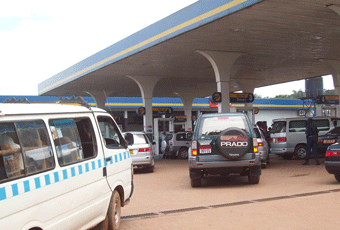
By Joan Akello
Fuel shortage and high prices have continued to haunt Uganda for weeks running.Apparently, poor delivery infrastructure particularly the unfinished pipeline is making the situation worse. The weakening shilling, transport and insurance premiums due to sea piracy at the Gulf of Aden were cited by Energy Minister Daudi Migereko, as the cause of the fuel shortage in October 2008.
People would expect Shell and Total, the two giant oil dealers in Uganda, to have fuel. But they appear the most hit by the shortage. Most small or retail oil dealers have fuel at their stations but the prices are more prohibitive than Shell’s and Total’s. They have increased the pump price of petrol from Shs2600 to Shs3, 500 in just four weeks up to April 2.
Ivan Kyayonka, the Country Manager of Shell Uganda, says: “The shortage is due to the increase in demand in the entire region for diesel for power generation. Supply constraints are because the infrastructure has not changed. There is only one point for offloading which is Mombasa port. This has caused congestion.” Kyayonka said some Shell stations run out of fuelbecause of low prices Shell charges.
James Buyungo, the Branch Manager of Rioil atNew Mulago station dismissed the claim that the declining value of the shilling is the cause of the escalating fuel prices. “The dollar value does not appreciate daily as compared to the petrol prices that rise daily,” he argues. He says oil pipeline from Mombasa broke down and it’s the cause of the fuel crisis. However, Hannington Mpiima of Kobil Uganda said all the pipelines at Nairobi, Nakuru, Eldoret, and Kisumu are operational. He said the problem is the fuel dealers are increasing prices to meet supply costs.
Mpiima says the problem is the bureaucracy and inefficiency of the Kenya Pipeline Authority (KPC). “There is lag in fuel turnover due to [disproportionate] allocation of space [fuel quota] to even companies with a small network. Those with a wide network have no space to offload their products and this delays distribution, causing shortage,” he said. He said there is no shortage of fuel at the pipeline, but the problem is its high cost. “We buy fuel in dollars and sell it in shillings and yet the shilling is weak.” Mpiima said despite the distance, importers have resorted to Mombasa port due to delays at the pipeline points in Nairobi. Eldoret and Kisumu.
Several fuel dealers say the increasing transportation costs due to distance is aggravating the prices fluctuations and the quantity imported. For instance, Ali Abdi, an employee at Gapco Kamwokya station, said: “Transporting fuel from Mombasa port instead of using the Nakuru-Eldoret pipeline has raised the fuel prices.”
Simon D’Ujanga, the minister of state for Energy, told a press conference on April 1 that fuel prices were increased by supply constraints during March mainly due to congestion at Mombasa port. He said the congestion delays discharge of petroleum products and aggravates transportation constraints on the pipeline system especially the Nairobi-Eldoret line. But he also admitted that there isgeneral scarcity of petrol in the region. “The increase in pump prices is also attributed to the international prices which have risen over the period. In addition, the depreciation of the shilling against the US dollar has exacerbated the trend in pump prices,” D’Ujanga said.
Rev. Frank Tukwasibwe, the Ag. Commissioner of Petroleum Supply Department andother fuel dealers Mamadou Ngom, Director General of Total Uganda, Daniel Segal, General Manager of Kobil Uganda and Fredrick Gibson, the Managing Director of Engen, attended the press conference.
Mamadou said: “The mushrooming dealers use the strategy of selling below the [price of] traditional companies to attract customers. Ugandans were enjoying low prices until the petrol shortage. These dealers are charging higher than Total.” He concurred that the high local demand anddepreciation of the shilling since January have caused the fuel shortage. He said there have been supply impediments due “low production from the Kenya refinery.”
Segal of Kobil said, “The international prices of petroleum between $75 to $82 barrel per day (bpd), an extra cost of $26,000 charged per vessel against piracy and the exchange rate have increased the price of petroleum. He cited delays of premium vessels at Mombasa because of limited infrastructure and inefficiency in the fuel transfer from vessels to tankers.
Buyungo of Rioil attributed the congestion at Mombasa to bureaucracy of Uganda Revenue Authority which delays clearance of fuel consignments at the weighing scale. This causes a chain delay at later at the Uganda National Bureau of Standards.
However, Sarah Birungi Banage, URA’s Assistant Commissioner for Public and Corporate Affairs, dismissed Buyungo’s claim. She said URA customs offices are only at Malaba and there are no queues of fuel trucks. She said URA cannot be blamed for delays beyond the Ugandan border.
Oil dealers said they have varying stocks of fuel but said they expect the situation to improve soon. Rev. Tukwasibwe said Uganda consumes 940,000 litres of petrol, 1,585,000litres of diesel and 170,000 litres of kerosene daily.
D’Ujanga appealed to Ugandan motorists to use fuel rationally, implying that the crisis may not be about to end. He cited the government’s plan to refurbish Jinja fuel reserves and complete extension of the Kenya pipeline to Uganda as solutions to the current crisis. He said the refurbishment of the fuel reserves could be completed in three months.
He said in the medium term an alternative route through Tanzania would help as the country waits for the oil refinery to be developed in Uganda.
However, these are the same plans the government gave to resolve the fuel shortage in 2008 following the post election violence in Kenya.
 The Independent Uganda: You get the Truth we Pay the Price
The Independent Uganda: You get the Truth we Pay the Price





